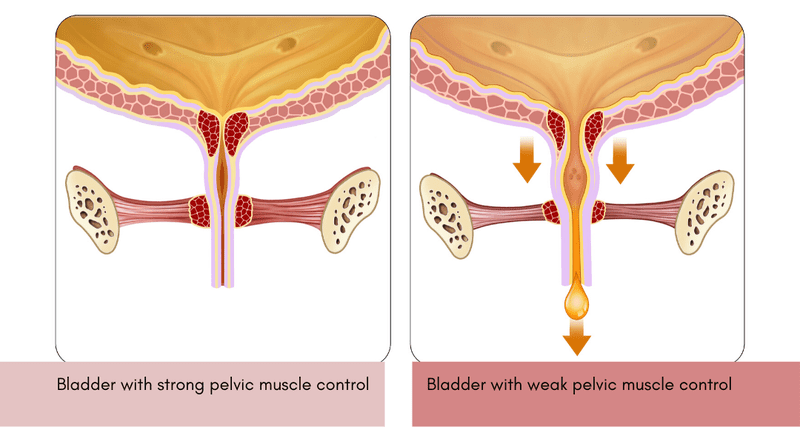The fear and embarrassment of urine leakage and frequent urination urges due to an overactive bladder affects majority of the elderly population. However, for women urinary incontinence and urinary disorders are not limited to an old age!
A large number of women observe urine leakage symptom, specially during transitional stages of life like pregnancy, after delivery, during and after menopause.
Irrespective of the stage of life you are at, Ayurvedic medicines, yoga, diet and lifestyle provide an effective cure for bladder leakage. Ayurveda can help you to strengthen the bladder, tone up your pelvic floor muscles and selectively remove the factors that aggravate the problem of urinary incontinence.
In this post, we will discuss the types of urinary incontinence, the causes and trigger factors for an overactive bladder symptoms and Ayurvedic treatment for urinary incontinence.
What is Urinary Incontinence?
Urinary Incontinence is involuntary urine leakage. It happens primarily due to weakness of the pelvic muscles in women and an enlarged prostate in men.
Incontinence can vary in severity, frequency and urgency. Sometimes urine leaks out when you cough or sneeze. Other times you might feel an urge to urinate, but before you get to a toilet the urge is so strong that you can’t hold it in anymore.

Causes of Overactive Bladder and Urine Leakage
In a healthy individual, multiple nerves and muscles work together to help the urinary bladder to store the urine and empty itself when needed.
Thus, any problems related to bladder health, poor muscle control or nervine dysfunction can lead to unintentional passage of urine.
Urinary incontinence can arise due to:
1. Lifestyle Factors and Ageing
- Caffeine: Drinks containing caffeine cause the bladder to fill up quickly, and an overfilled bladder can begin to leak.
- Age Related Changes: With age, changes occur in the Lower Urinary Tract (LUT) and micturition. These changes can lead to incontinence, though not all the changes can be held responsible.
- Frequent suppression of urination can weaken bladder muscle and pelvic muscles. This can eventually lead to urinary disorder as incontinence and urinary infection.
2. Medical Conditions
- Diabetes and Neuropathy: Diabetes can damage nerves around the bladder that help with proper urinary function.
- Obesity: Excessive weight means there is a heavier load on the bladder, and the muscles there can be weakened in the long run.
- Constipation: The strain to have bowel movement can put pressure and weaken the bladder muscles and pelvic muscles.
- Nerve Damage: when nerves are damaged, they can begin to misfire, send signals at the wrong time, or send no signals at all to the bladder. Childbirth or multiple sclerosis can cause damage to the nerves.
- Other urinary system or urinary tract related health conditions such as kidney stones, urinary calculi, bladder stones, urine infection, bladder infection, bacterial infection and kidney disease.
3. Medications or Surgeries
- Medications such as diuretics can also be a risk factor. The urinary incontinence resolves when the medication is stopped.
- Surgery: Surgery involving reproductive organs can tamper with the support offered by the pelvic floor muscles. Hysterectomy, uterus removal, can cause these complications.
Types of Urinary Incontinence
Based on the symptoms, urinary incontinence can be classed into different types.
1. Stress Incontinence
It is the most common type of urinary incontinence that affects men and women alike. Stress incontinence accounts for about 49% of all cases of bladder leakage and overactive bladder problems.
It happens due to the failure of the bladder muscle to close tightly while the bladder is filling up.
Also, in this case, the pelvic muscles are weak. Thus, the pressure is transferred to the bladder and it makes them work harder.
As a result, any stress caused due even to common activities like laughing, physical exercise, coughing, sneezing, etc, can cause leakage of urine.
2. Urge Incontinence
This arises as a result of inflammation or irritation of the bladder and urinary tract. Urge Incontinence accounts for 21% of all cases.
There is a sudden urge to urinate, and this can cause a leakage before the patient is able to reach a bathroom. Volume of the leakage may be large or small.
Frequent urination in urge continence can be as many as 8 times in a day. Urge incontinence also comes with nocturia (a frequent need to arise during the night to urinate).
3. Mixed Incontinence
This happens in 29% of cases. It combines symptoms of both Stress and Urge Incontinence. That is, urine leakage due to stress occurs, and the sudden urges to urinate also occurs concurrently.
4. Postural Incontinence
This is a very rare type of incontinence. There is urine leakage even with changes in posture.
5. Transient Incontinence
This is precipitated by remediable factors. It usually wears off after the causative factors have been remedied.
6. Overflow Incontinence
There is small continuous leakage of urine due to improper function of the detrusor muscle that is responsible for urination or due to bladder outlet obstruction.
Urinary Incontinence Treatment in Modern Medicine
In modern medicine, there are methods of curing this condition, which include:
- Medicines: Anticholinergic drugs, for example, help reduce involuntary detrusor muscle contractions.
- Surgical Options: detrusor myomectomy and bladder myomectomy.
- Pelvic Floor Muscle Training (PFMT): Practising this for 3-4 months is also an effective remedy. People who practice this are 7 times more likely to be cured.
But aside these, there are highly recommended Ayurvedic medicine for urinary incontinence that you should try first.
Ayurvedic treatment for urine leakage is all natural and holistic in nature and it comes with no risk or side effect. What’s more is that, they are cost-effective.
Ayurvedic View of Overactive Bladder & Urinary Incontinence
As per Ayurveda, urinary continence is interpreted as Mutrakriccha (Difficulty in urination) that covers the conditions of kidney and urinary tract infection.
In particular, urinary incontinence is caused by an imbalance in the Apana Vata dosha. It is a subdosha of Vata, and it is responsible for all functions related to elimination, urination and reproductive system functions.
Apana vata is prone to imbalance due to diet, lifestyle and stress like conditions.
In addition, if there is an imbalance of pitta dosha; it can lead to symptoms of inflammation and burning sensation while urination.

Ayurvedic Treatment for Urinary Incontinence
Ayurveda can help you treat urinary disorders caused by the elevated dosas with herbs, Ayurvedic medicine, nourishing diet, yoga and physical therapies such as herbal oil massages.
Ayurvedic holistic approach prevents frequent urination & bladder leakage by following an individual specific health protocol that helps to:
- Pacify the elevated doshas
- Tone up and strengthen pelvic muscles
- Protect urinary system organs such as bladder, urinary tract, pelvic muscles and the kidneys from further damage
- Balance the hormones
- Balanced Nutrition to prevent nutritional deficiencies
Healing urinary incontinence means restoring the proper quantity and quality of vata dosha and pitta dosha in the body. This will help to establish a proper functioning of the urinary system.
Let’s see how you can implement Ayurvedic principles in your diet and lifestyle to prevent urine leakage problems:
1. Ayurvedic Medicine for Treatment of Urinary Incontinence
Ayurvedic medicine has been used for centuries to treat a variety of ailments, including urinary incontinence. Ayurvedic herbs are nutrient dense plant based formulations that are antimicrobial in nature and supportive of kidney function.
Here is a list of highly effective Ayurvedic medicine for urinary incontinence and urine disorders:
- Punarnava
- Ashwagandha
- Daruharidra
- Giloy
- Mimosa (Touch me Not)
- Palash
- Varuna
- Corn Silk
- Gokshuru
- Sage
Natural Remedies to Prevent Bladder Leakage
- Amla: Amla juice mixed with honey and consumed with a ripe banana two or three times a day are useful. This helps to clear the bladder and also tones the muscles, helping to improve control over involuntary urination.
- Tulsi: 2-3 three fresh leaves of tulsi, crushed and taken with a spoon of honey can give good results. This is best in cases where the urinary problem is caused by urinary infection.
- Reetha: Soak it overnight and drink it early the next morning before any meal. This helps manage frequent urination, and the bonus is that it is great for hair.
- A cotton bandage dipped in dhanwantaram oil can be placed over the abdomen for 20-30 minutes daily. This normalizes the flow of apana vata in the body.

2. Ayurvedic Lifestyle for Urinary Incontinence Treatment
Beyond the herbs and other remedies, to live healthy, you must be willing to help your body to take care of itself. Really, the body was made to be self-sufficient.
However, some lifestyle and dietary habits that we indulge in antagonize the body’s natural intelligence. Correcting these habits go a long way to solving most health problems that are presented.
- Minimize fluid intake by evening if there’s a concern of nocturia.
- Bladder training: Go to bathroom at set times. Keep strictly to this schedule. You can start with hourly visits, and then increase the interval by about 15 minutes each successive week. This will help ‘force the bladder to remember’ when to discharge or not.
- Quit smoking.
- Treat constipation.
- Practice Kegel exercises. These help to strengthen the pelvic floor muscles.
- Lose excess weight.
- In case of leakage, clean self with dry cloth. Douching is not encouraged.
- If you have urinary incontinence, keep in mind that fear, worry and anxiety will not help. If anything, they disturb the signals sent by the nervous system to the bladder. You might have experienced or witnessed leakage due to fear or outright terror before, where a person’s bladder lets loose when confronted with a terrifying situation.
3. Ayurvedic Diet to Prevent Bladder Leakage
- Take less caffeine and carbonated drinks.
- Avoid highly acidic & alkaline foods like sodas, artificial sweeteners, spicy foods, citrus fruits and juices, and tomato-based foods. These disturb normal functioning of urinary system and worsen the problem of continence.
- Take fresh, warm and nutritious foods that balance vata dosha and strengthen the muscles.
- Limit intake of spicy foods.
- Take foods rich in fiber, nuts, beans and legumes, and peas.
- Fruits like pears, apples, potatoes and melons are helpful.
- Vitamin D rich food should also be embraced, including egg yolks, mushroom, fatty fish, etc.
- Regular consumption of 15-20 raisins and walnuts a day can help to strengthen and tone up the bladder muscles and prevent nutritional deficiencies.
4. Yoga for Urinary Incontinence Treatment
Who wants to practice yoga when you have a leaky bladder? You probably dread the fact that your bladder will leak out some urine as you are doing the poses.
But thankfully, having a leaky bladder does not mean you’re disqualified from practicing Yoga. There are some yoga poses suitable for a leaky bladder.
But it’s beyond performing yoga without the fear and embarrassment of leakage. These poses also help to alleviate urinary incontinence. They are capable of strengthening the pelvic floor and muscles that will help you better control your bladder.
So, what are some wonderful Yoga asanas to strengthen your bladder and pelvic muscles?

- Supta Badha Konasana (Reclining Bound Angle Pose)
- Child’s pose
- Cobbler’s pose
- Setu Bandha (Bridge Pose)
- Badha Konasana (Bound Angle Pose)
- Utkatasana (Chair Pose)
- Legs up the wall
FAQ
1. Why are women more prone to Weak Bladder?
15-30% of people above 65 years are affected with overactive bladder problems. Women are two times more likely to struggle with urinary disorders than men.
As many as 40% of the women suffer from bladder control problems at multiple stages of life. A weak bladder can happen in pregnancy, after the delivery of the baby, after any surgeries of reproductive system organs (hysterectomy for example), at menopause and at any point when their hormones start to give them a hard time!
Women are more liable to urinary incontinence because of the changes in body that happen during pregnancy, childbirth and menopause.
These conditions place a lot of strain on the pelvic floor muscles. The pelvic floor supports the womb, bladder and the urethra. So, it only makes sense that it is weakened by pregnancy.
Additionally, the female urethra is shorter than that of males. Thus, there is less muscle available to constrict the opening and to form the sphincter that is supposed to pinch the opening shut.
Thus, there is a higher chance of leakage.
2. How do you fix urinary incontinence naturally?
Almost everyone will experience some urinary incontinence at some point in their lives. The good news is that there are natural ways to fix this problem.
One of the best things you can do is to try and strengthen your pelvic floor muscles. These muscles support your bladder and help to keep urine from leaking out. Kegel exercises are one way to do this. To do a Kegel, simply squeeze the muscles you would use to stop the flow of urine. Hold for a count of three, then release. Repeat this 10-15 times, three times per day.
Another helpful tip is to avoid foods and drinks that can irritate your bladder or contribute to incontinence. This includes caffeine, alcohol, excessively sugary, salty and fried foods.
If you are not able to find relief despite changes in your diet & lifestyle, you should seek Ayurvedic treatment for bladder leakage. Medhya Herbals’ offers holistic natural ways to strengthen the bladder and prevent urinary incontinence. Schedule your consultation with Ayurvedic Doctor at Medhya Herbals over here.
3. Is there a herbal remedy for incontinence?
Yes, there are a few different herbal remedies that can help with incontinence. Saw palmetto is an herb that can be helpful for both men and women who suffer from urinary incontinence. It helps to improve bladder control and also helps to decrease the frequency of urination.
Another herb that can be helpful for incontinence is horsetail. This herb contains silica which is beneficial for strengthening the tissues around the bladder and helping to improve bladder function. Finally, chamomile is a soothing herb that can be helpful for relieving symptoms of stress-related incontinence.
4. What are the Health Problems associated with Weak Bladder Leakage and Urine Leakage?
Urinary Incontinence can be embarrassing to the patient. No one likes to pee in their pants while they are in the crowd or even amongst their loved ones.
Thus, urinary problems often become an extra reason of stress and mental jostle that affects the health of the person. It can lead to:
- Social withdrawal;
- Depression;
- Poor self-image;
- Sleep deprivation, as there is need to frequently rise up to empty the bladder;
- Reduced productivity due to frequent interruptions;
- Sexual dysfunction;
- Urinary tract infection;
- Falls with fractures;
- Morbidity;
- Cellulitis;
- Pressure ulcers
Thankfully, there are natural ways to regain control of bladder leakage. Adopting these measures will help you to avoid all the associated physical and psychological complications.
5. Which organs are involved in urination process?
Proper functioning of urinary system is dependent on a complex interplay of multiple systems and organs that are responsible for the storage and expulsion of urine from the bladder.
- Bladder Muscles (both smooth and striated)
- Nerves (both of the sympathetic and parasympathetic nervous systems)
- Our brain
- Pelvic organs (including bladder, urethra, and prostate gland in men)
It is no wonder that there can be problems in the functioning of any of the multiple organs. And any of this, however small can lead to urinary incontinence.
References

